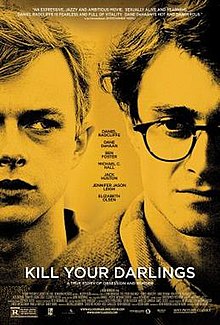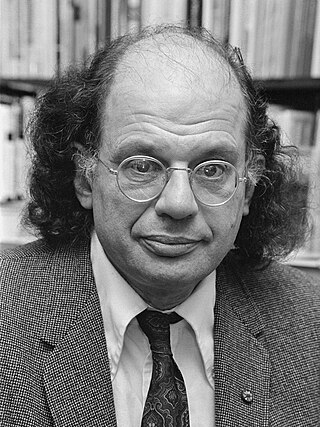
Irwin Allen Ginsberg was an American poet and writer. As a student at Columbia University in the 1940s, he began friendships with Lucien Carr, William S. Burroughs and Jack Kerouac, forming the core of the Beat Generation. He vigorously opposed militarism, economic materialism, and sexual repression, and he embodied various aspects of this counterculture with his views on drugs, sex, multiculturalism, hostility to bureaucracy, and openness to Eastern religions.

Jean-Louis Lebris de Kérouac, known as Jack Kerouac, was an American novelist and poet who, alongside William S. Burroughs and Allen Ginsberg, was a pioneer of the Beat Generation.

William Seward Burroughs II was an American writer and visual artist. He is widely considered a primary figure of the Beat Generation and a major postmodern author who influenced popular culture and literature. Burroughs wrote eighteen novels and novellas, six collections of short stories and four collections of essays, and five books have been published of his interviews and correspondences; he was initially briefly known by the pen name William Lee. He also collaborated on projects and recordings with numerous performers and musicians, made many appearances in films, and created and exhibited thousands of visual artworks, including his celebrated "Shotgun Art".

The Beat Generation was a literary subculture movement started by a group of authors whose work explored and influenced American culture and politics in the post-World War II era. The bulk of their work was published and popularized by Silent Generationers in the 1950s, better known as Beatniks. The central elements of Beat culture are the rejection of standard narrative values, making a spiritual quest, the exploration of American and Eastern religions, the rejection of economic materialism, explicit portrayals of the human condition, experimentation with psychedelic drugs, and sexual liberation and exploration.
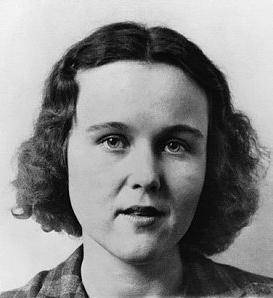
Joan Vollmer was an influential participant in the early Beat Generation circle. While a student at Barnard College, she became the roommate of Edie Parker. Their apartment became a gathering place for the Beats during the 1940s, where Vollmer was often at the center of marathon, all-night discussions. In 1946, she began a relationship with William S. Burroughs, later becoming his common-law wife. In 1951, Burroughs killed Vollmer. He claimed, and shortly thereafter denied, the killing was a drunken attempt at playing William Tell.
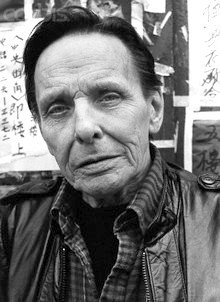
Herbert Edwin Huncke was an American writer and poet, and an active participant in a number of emerging cultural, social and aesthetic movements of the 20th century in America. He was a member of the Beat Generation and is reputed to have coined the term.

Junkie: Confessions of an Unredeemed Drug Addict, or Junky, is a 1953 novel by American Beat generation writer William S. Burroughs. The book follows "William Lee" as he struggles with his addiction to morphine and heroin. Burroughs based the story on his own experiences with drugs, and he published it under the pen name William Lee. Some critics view the character William Lee as simply Burroughs himself; in this reading, Junkie is a largely-autobiographical memoir. Others view Lee as a fictional character based on the author.
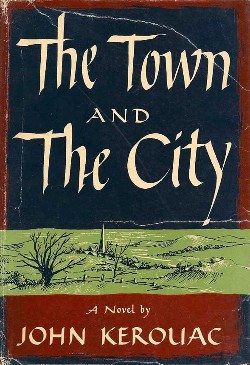
The Town and the City is a novel by Jack Kerouac, published by Harcourt Brace in 1950. This was the first major work published by Kerouac, who later became famous for his second novel On the Road (1957). Like all of Jack Kerouac's major works, The Town and the City is essentially an autobiographical novel, though less directly so than most of his other works. The Town and the City was written in a conventional manner over a period of years, and much more novelistic license was taken with this work than after Kerouac's adoption of quickly written "spontaneous prose". The Town and the City was written before Kerouac had developed his own style, and it is heavily influenced by Thomas Wolfe.
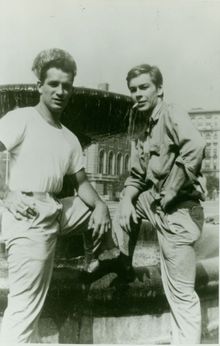
Lucien Carr was a key member of the original New York City circle of the Beat Generation in the 1940s and also a convicted manslaughterer. He later worked for many years as an editor for United Press International.
Edie Kerouac-Parker was the author of the memoir You'll Be Okay, about her life with her first husband, Jack Kerouac, and the early days of the Beat Generation. While an art student under George Grosz at Barnard College, she and fellow Barnard student and friend Joan Vollmer shared an apartment on 118th Street in New York City which came to be frequented by many of the then unknown Beats, among them Vollmer's eventual husband William S. Burroughs, and fellow Columbia students Jack Kerouac and Allen Ginsberg as well as Lucien Carr.

Desolation Angels is a semi-autobiographical novel written by Beat Generation author Jack Kerouac, which makes up part of his Duluoz Legend. It was published in 1965, but was written years earlier, around the time On the Road was in the process of publication. The events described in the novel take place from 1956-1957. Much of the psychological struggle which the novel's protagonist, Jack Duluoz, undergoes in the novel reflects Kerouac's own increasing disenchantment with the Buddhist philosophy. Throughout the novel, Kerouac discusses his disenchantment with fame, and complicated feelings towards the Beat Generation. He also discusses his relationship with his mother and his friends such as Allen Ginsberg, Neal Cassady, Lucienn Carr and William S. Burroughs. The novel is also notable for being a relatively positive portrayal of homosexuality and homosexual characters, despite its use of words that were at the time considered homophobic slurs.

And the Hippos Were Boiled in Their Tanks is a novel by Jack Kerouac and William S. Burroughs. It was written in 1945, a full decade before the two authors became famous as leading figures of the Beat Generation, and remained unpublished in complete form until 2008.

Orpheus Emerged is a novella written by Jack Kerouac in 1945 when he was at Columbia University. It was discovered after his death and published in 2000.

Old Angel Midnight is a long narrative poem by American novelist and poet Jack Kerouac. It was culled from five notebooks spanning from 1956 to 1959, while Kerouac was fully absorbed by his studies of Buddhism and Buddhist philosophy. Kerouac initially experimented with Old Angel Midnight in 1953 in his diary titled "1953. Notes again." In entries dated from November 20 to December 3, 1953, he made notes on "Lucien Midnight" which was to be originally conceptualized in what he called "book movie" form, when he closed his eyes and projected onto paper a cinematic sense of what he heard. A bookmovie, he explained in Some of the Dharma, is a "prose concentration camera-eye visions of a definite movie of the mind with fade-ins, pans, close-ups, and fade-outs." Kerouac's notes on Lucien Midnight were written while staying in the Lower East Side where he initially heard sounds coming through a tenement window from the wash court below. He then heard voices coming from kitchens of the other occupants in nearby apartment buildings and a man named Paddy arriving home drunk, and even a junky stirring in his bed. Kerouac conceptualized an idea of developing a work based on James Joyce’s experimental novel Finnegans Wake where the “sounds of the universe” became the chief “plot” with all of its associated “neologisms, mental associations, puns and wordmixes” that stewed a plethora of languages and “nonlanguages.” Kerouac determinedly “scribbled out in a strictly intuitional discipline at breakneck speed” the fledgling prose that would finally comprise the finished book for City Lights's Pocket Poet series eight years later. Kerouac's one dogma was to compose Lucien Midnight strictly in pencil by candlelight. Lucien Midnight differs from his sketching method of writing because it is based upon an aural experience, and not visual. The bookmovie approach was abandoned in 1953 in favor of a different approach he had stylistically achieved by 1956.

Beat is a 2000 American biographical drama film written and directed by Gary Walkow, and starring Courtney Love, Kiefer Sutherland, Norman Reedus, and Ron Livingston. The film focuses primarily on the last several weeks of writer Joan Vollmer's life in 1951 Mexico City, leading up to her accidental killing by her husband, the writer William S. Burroughs. It premiered at the Sundance Film Festival in January 2000 and was entered into the 22nd Moscow International Film Festival.

Corso: The Last Beat is a 2009 documentary film, with on-screen narration by Ethan Hawke and appearances by Patti Smith, Allen Ginsberg, William Burroughs and Gregory Corso.

Howl is a 2010 American film which explores both the 1955 Six Gallery debut and the 1957 obscenity trial of 20th-century American poet Allen Ginsberg's noted poem "Howl". The film is written and directed by Rob Epstein and Jeffrey Friedman and stars James Franco as Ginsberg.

On The Road is a 2012 adventure drama film directed by Walter Salles. It is an adaptation of Jack Kerouac's 1957 novel On the Road and stars an ensemble cast featuring Garrett Hedlund, Sam Riley, Kristen Stewart, Alice Braga, Amy Adams, Tom Sturridge, Danny Morgan, Elisabeth Moss, Kirsten Dunst, and Viggo Mortensen. The executive producers were Francis Ford Coppola, Patrick Batteux, Jerry Leider, and Tessa Ross. Filming began on August 4, 2010, in Montreal, Quebec, with a $25 million budget. The story is based on the years Kerouac spent travelling the United States in the late 1940s with his friend Neal Cassady and several other Beat Generation figures who would go on to fame in their own right, including William S. Burroughs and Allen Ginsberg. On May 23, 2012, the film premiered in competition for the Palme d'Or at the 2012 Cannes Film Festival. The film received mixed early reviews after it premiered at the film festival. The film also premiered at the 2012 Toronto International Film Festival in September.

Killer Films is a New York City-based independent film production company founded in 1995 by film producers Christine Vachon and Pamela Koffler. The company has produced many acclaimed independent films over the past two decades including Far From Heaven, Boys Don't Cry, One Hour Photo, Kids, Hedwig and the Angry Inch, Happiness, Velvet Goldmine, Safe, I Shot Andy Warhol, Swoon, I'm Not There, Kill Your Darlings, Still Alice and Carol. Killer Films also executive produced Todd Haynes' five episode HBO miniseries Mildred Pierce, which went on to win five Emmys, a Golden Globe and a Screen Actors Guild Award.
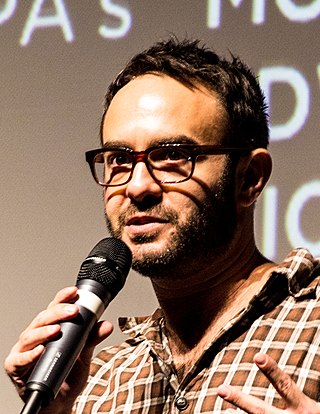
John Krokidas is an American film director, screenwriter, and producer, best known for his directorial debut film, the 2013 biographical drama Kill Your Darlings.
